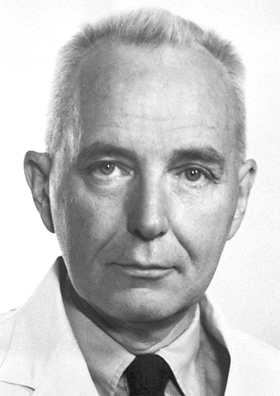Charles Brenton Huggins facts for kids
Quick facts for kids
Charles Brenton Huggins
|
|
|---|---|

Huggins in 1966
|
|
| Born | September 22, 1901 Halifax, Nova Scotia, Canada
|
| Died | January 12, 1997 (aged 95) Chicago, Illinois, U.S.
|
| Citizenship | Canadian, American |
| Alma mater | Acadia University Harvard University |
| Known for | prostate cancer hormones |
| Awards | Nobel Prize for Physiology or Medicine (1966) Cameron Prize for Therapeutics of the University of Edinburgh (1956) Gairdner Foundation International Award (1966) |
| Scientific career | |
| Fields | physiology |
| Institutions | University of Michigan, University of Chicago |
Charles Brenton Huggins (born September 22, 1901 – died January 12, 1997) was a doctor and scientist. He was from both Canada and the United States. He worked at the University of Chicago. Dr. Huggins studied cancer, especially prostate cancer.
In 1966, he won the Nobel Prize for Physiology or Medicine. He earned this award for an important discovery he made in 1941. He found that hormones could help control the spread of some cancers. This was the first time anyone showed that chemicals could be used to fight cancer.
Contents
About Charles Huggins
Charles Huggins was born in Halifax, Nova Scotia, Canada. This was on September 22, 1901.
His Education
He went to Acadia University and earned a Bachelor of Arts degree in 1920. After that, he studied medicine at Harvard Medical School. He became a medical doctor (MD) in 1924.
He then worked as an intern and resident in surgery. This training took place at the University of Michigan.
His Cancer Research
Dr. Huggins developed a way to study how hormones affect the prostate gland. The prostate is a small gland in men. He found that changes in hormones could influence prostate cancer.
He was the first scientist to use a full-body approach to treat prostate cancer. This was a big step forward in cancer treatment. It showed that chemicals could help control the disease.
Awards and Recognition
Charles Huggins received many honors for his work. In 1949, he became a member of important science groups. These included the United States National Academy of Sciences.
He also received the Cameron Prize for Therapeutics of the University of Edinburgh in 1958. In 1962, he joined the American Philosophical Society.
His biggest award was the Nobel Prize in Physiology or Medicine. He received this on October 13, 1966.
Later Life
Charles Huggins passed away on January 12, 1997. He was 95 years old. He died in Chicago, Illinois, U.S. His wife had passed away in 1983.
See also
 In Spanish: Charles Brenton Huggins para niños
In Spanish: Charles Brenton Huggins para niños
 | Isaac Myers |
 | D. Hamilton Jackson |
 | A. Philip Randolph |

